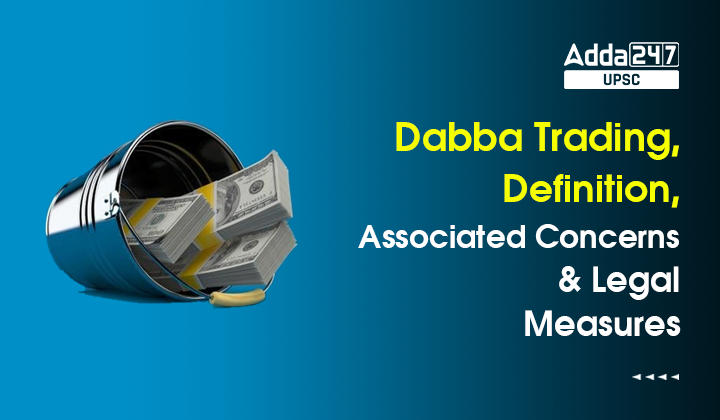Table of Contents
Dabba Trading: Dabba Trading refers to a form of informal trading that occurs outside the regulated framework of stock exchanges. Dabba Trading is also important for UPSC Prelims Exam 2023 and UPSC Mains Exam (GS Paper 3- Indian Economy)
Dabba Trading in News
Over the course of the last week, the National Stock Exchange (NSE) has released several notifications identifying individuals or groups that have been participating in “dabba trading”.
- The stock exchange has issued a warning to retail investors advising them against investing in products related to the stock market that offer indicative, assured, or guaranteed returns, as such activities are illegal.
- The National Stock Exchange (NSE) has also clarified that the entities offering such products are not recognized as authorized members of the exchange.
Dabba Trading Definition
The term “dabba trading” refers to a form of informal trading that occurs outside the regulated framework of stock exchanges. In this type of trading, traders speculate on the movement of stock prices without actually making a real transaction to take physical ownership of a particular stock, which is a standard practice in the exchange. In essence, dabba trading can be thought of as a form of gambling that revolves around predicting stock price movements.
Examples of Dabba Trading
Consider an investor who places a wager on a stock at a particular price point, let’s say ₹1,000. If the price point increases to ₹1,500, the investor would earn a profit of ₹500. However, if the price point drops to ₹900, the investor would have to pay the difference to the dabba broker. As a result, the broker’s profit is equivalent to the investor’s loss, and vice versa. The impact of these equations is particularly significant during bullish or bearish market conditions.
Associated Concerns with Dabba Trading
Important concerns with the dabba trading are listed below-
Avoids Regulatory Oversight
The main objective of dabba trading is to avoid regulatory oversight. To achieve this, transactions are typically conducted using cash, and unregistered software terminals are utilized to facilitate the trades.
- Additionally, informal or “kaccha” records, transaction books, challans, DD receipts, cash receipts, and bills/contract notes may be used as evidence of trading.
Avoids Taxation
The lack of proper documentation regarding income or gains in dabba trading enables traders to evade taxation, thereby avoiding payment of the Commodity Transaction Tax (CTT) or Securities Transaction Tax (STT) on their transactions.
- Additionally, the use of cash in such transactions means that they fall outside the scope of the formal banking system.
- These factors combined lead to a decrease in revenue for the government.
Promote Generation of Black Money and Money Laundering
The use of cash and lack of auditable records in dabba trading could promote the emergence of “black money” and the growth of a shadow economy.
- This, in turn, may increase the likelihood of risks associated with money laundering and criminal activities.
Risk to Investor’s Money
The main risk associated with dabba trading is the potential for the broker to default on payments to the investor or for the entity to become insolvent or bankrupt.
- Since such trading occurs outside the purview of regulation, investors do not have access to formal provisions for investor protection or dispute resolution mechanisms available within an exchange.
- This lack of regulatory oversight also means that there are no formal grievance redressal mechanisms in place for investors.
Harassment by the Brokers
According to an industry expert who wished to remain anonymous, clients who enter the dabba trading ecosystem are subjected to harassment by the broker’s “recovery agents” if they default on payments.
- Additionally, profits may be withheld from investors.
Why Some Investors Choose Dabba Trading?
The source also revealed that aside from tax evasion, potential investors are attracted to the aggressive marketing strategies, user-friendly trading apps with quality interfaces, and the lack of identity verification requirements.
- Brokers are also said to keep their fees and margins open for negotiation depending on an individual’s trading profile and observable volumes and trends.
Legal Provisions and Punishment
Under Section 23(1) of the Securities Contracts (Regulation) Act (SCRA) of 1956, dabba trading is considered a punishable offence. Conviction for such an offence can result in imprisonment for up to 10 years, a fine of up to ₹25 crore, or both.
What Is Emissions Trading Scheme(ETS)? India To Bring Soon



 TSPSC Group 1 Question Paper 2024, Downl...
TSPSC Group 1 Question Paper 2024, Downl...
 TSPSC Group 1 Answer key 2024 Out, Downl...
TSPSC Group 1 Answer key 2024 Out, Downl...
 UPSC Prelims 2024 Question Paper, Downlo...
UPSC Prelims 2024 Question Paper, Downlo...
